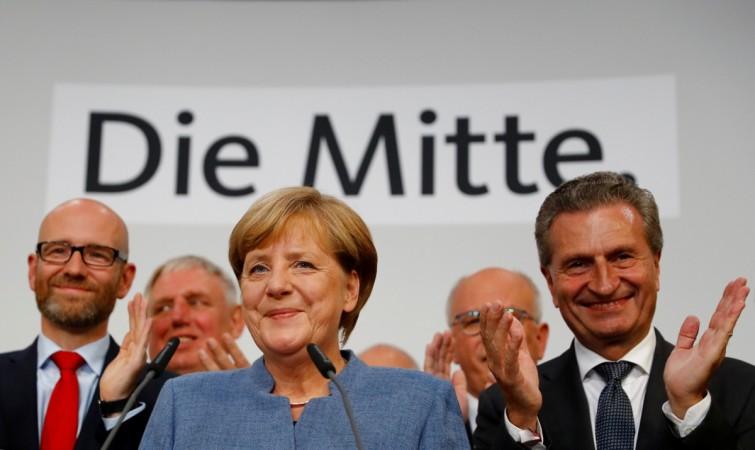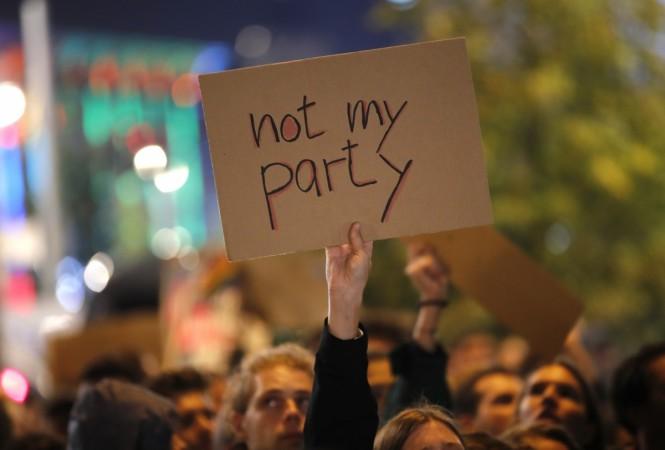German Chancellor Angela Merkel won a historic fourth term in the national elections on Sunday. However, she now has to face the prospect of formulating a coalition with two new parties after her conservative party Christian Democratic Union (CDU) was weakened by voters in the poll.
Although CDU will continue to be Germany's largest party, it will now have to look for a three-way coalition to avoid forming a majority government. Merkel's fourth term is set to be far less stable one than her last three terms.

While CDU clenched a projected 33 percent of votes, its main opposition party Social Democrats (SPD) led by Martin Schulz tumbled to a mere 20.5 percent. Schulz conceded that party has suffered a "crushing election defeat," with projections showing the party's worst performance in post-World War II Germany.
"We have a mandate to form a new government, and no government can be formed against us," Merkel told her supporters after her win. The chancellor added that it wasn't a "matter of course" to finish first after 12 years in power and that the past four years were "extremely challenging," the Associated Press reported.
She stressed that "we live in stormy times" internationally," and declared: "I have the intention of achieving a stable government in Germany."
AfD Surge Causes Protests in Germany
The most concerning outcome of this election has been the surge of the far-right party Alternative for Germany (AfD). With 13 percent of votes secured, AfD has become the third-largest party in the Bundestag.

Many Germans, concerned about a far-right party entering parliament for the first time in more than half a century, took to streets to protest. Reports state that spontaneous protests erupted across Germany in opposition to the AfD's victory, particularly in major cities like Cologne, Berlin and Hamburg.
Hundreds of demonstrators assimilated in Berlin's Alexanderplatz until well past midnight, chanting "Nazis out!"
Seeing its widespread criticism, the populist party attempted to downplay it with its co-chair Jörg Meuthen insisting that the party is "neither racist nor xenophobic." The AfD, however, has taken an official stand against Islam, gay marriage and Germany's refugee policy. Reports state that many of its members have also been seen embroiled in anti-Semitic controversies.

Jewish groups in Europe and in the United States also expressed their alarm at the success of a far-right party in Germany and urged other parties to not form an alliance with the AfD.
The far-right has not been represented in the German parliament since the 1950s, a reflection of the country's efforts to distance itself from the horrors of the Nazi Holocaust, where nearly 6 million Jews were exterminated.
President of the New York-based World Jewish Congress, Ronald Lauder, said that Merkel was a "true friend of Israel and the Jewish people" and condemned AfD's success in Germany at a time when anti-Semitism has seen an increase across the globe.

"It is abhorrent that the AfD party, a disgraceful reactionary movement which recalls the worst of Germany's past and should be outlawed, now has the ability within the German parliament to promote its vile platform," Lauder was quoted as saying by Reuters.
The AfD has profited big from the lingering resentment at Merkel's 2015 decision to open the country's border for over 1 million refugees, mainly fleeing Middle East wars. The AfD has taken a stand saying immigration jeopardises Germany's culture.



!['Valentine's Week in Parliament'? : Saugata Roy, June Malia's cosy conversation amid house session goes viral [Watch] 'Valentine's Week in Parliament'? : Saugata Roy, June Malia's cosy conversation amid house session goes viral [Watch]](https://data1.ibtimes.co.in/en/full/828484/valentines-week-parliament-saugata-roy-june-malias-cosy-conversation-amid-house.jpg?w=220&h=135&l=50&t=40)




!['Valentine's Week in Parliament'? : Saugata Roy, June Malia's cosy conversation amid house session goes viral [Watch]](https://data1.ibtimes.co.in/en/full/828484/valentines-week-parliament-saugata-roy-june-malias-cosy-conversation-amid-house.jpg?w=220&h=138)





!['Valentine's Week in Parliament'? : Saugata Roy, June Malia's cosy conversation amid house session goes viral [Watch]](https://data1.ibtimes.co.in/en/full/828484/valentines-week-parliament-saugata-roy-june-malias-cosy-conversation-amid-house.jpg?w=220&h=135)

